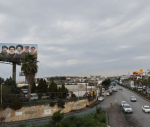You are here
Jordan’s economic new normal
Oct 08,2017 - Last updated at Oct 08,2017
The official message conveyed to Jordanians is that outstanding economic deterioration is a transitory phase directly linked to temporary developments and regional instability.
While such argument reflects part of the reality, it must be acknowledged that Jordan is experiencing a new economic normal that will prevail for many years until a breakthrough is realised.
Fiscal room is very tight, if it even exists, while external imbalances impose a speed limit to domestic economic activity.
New externally driven challenges are also emerging on the fiscal and monetary fronts, with lower oil prices, implying lower foreign grants and a decreasing amount of remittances over time.
The existence of an economic new normal is evidenced in the failure of huge fiscal savings over the past five years to maintain the already high level of public debt relative to GDP.
After saving JD800 million by removing fuel subsidies in 2012, and a similar amount by reverting to gas-generated electricity, despite consecutive hikes of electricity and water tariffs, and even with oil and gas prices decreasing by more than 50 per cent, the 2016 government budget was in need of about JD500 million of new funds just to pay arrears, and the 2017 budget is in need of the same amount of new money to fix its structural imbalances.
The paradox lies in the roots of this rough new economic normal.
The prevailing conviction notwithstanding, the current economic circumstances cannot be entirely justified by the turbulence in the region; the unsustainable fiscal expansion that surpassed economic fundamentals for years and decades is also to blame.
In other words, we have been living way beyond our limits for very long, through borrowing, privatising assets, receiving exceptional grants and using certain political circumstances as a leverage, none available anymore.
Accordingly, a restored regional stability and the reopening of blocked trade routes and destinations will be neither sufficient to resolve dominant economic challenges nor capable to boost Jordanians’ living standards in a tangible manner.
The ambitious goals of resolving economic obstacles and improving living standards will not be achieved unless policymakers publicly acknowledge Jordan’s economic new normal and translate this acknowledgment into implementable policies and decisive actions.
In this regard, the government should seriously consider improving the business environment and unlocking the potential for new businesses and investments by relaxing regulations ruling land use, business licensing, construction limitations and employment.
Revising the government’s record of rejected investment proposals is important to spotlight bottlenecks and come up with the optimal prescription for a gradual but impactful deregulation process.
More importantly, the government should revisit the criteria for fund allocation and align economic policies with the repercussions and implications of the new normal: limited fiscal room and decreased inflows of foreign currency.
On this front, government subsidies and exemptions should become more rationally directed at competitive and foreign currency-generating sectors, rather than being randomly distributed to preserve the status quo and protect the interests of dominant market players.
The economic planning process should also be revisited in order to perform the smart shift from holistic economic plans that overestimate fiscal and operational capabilities to realistic plans that focus uniquely on competitive sectors like tourism, information technology and healthcare.
An official announcement of national priority economic sectors will represent a major milestone in embracing competitiveness.
Changing the government’s rhetoric on economy, from one that attributes economic hardship to temporary circumstances to one that boldly acknowledges a rough new normal for years to come, is the first step in the right direction.
However, such pivotal step will not be met with flowers, but will strongly backfire if not accompanied by sound planning and credible implementation.
The writer, an economist and columnist, contributed this article to The Jordan Times.












